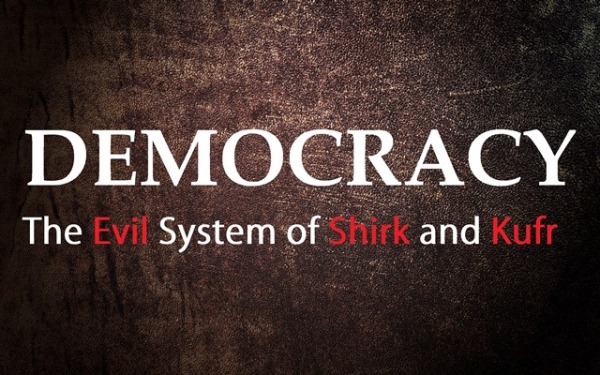
Shaykh Nāsir ibn Hamd Al Fahd (fakk
Allāhu asrahu) was asked, what is the meaning of Democracy? And what is
the difference between Democracy and Shūrā? And what is the ruling
regarding the entering of Parliaments?
The Shaykh responded by saying:
Democracy
is the rule of the people, and it means that the legislation and
permitting and prohibiting is for the population itself, and it was
existent in Greece, before the Birth of ‘Īsa (as), then it developed
further after the English Revolution, then the French (revolution),
until it reached what it reached (i.e. Today).
And it’s purely kuffr, because the judgement/ruling is for Allāh with no partners ascribed to him, as Allāh says:
"He makes none to share in His Decision and His rule"
And
it is differs to the Shūrā more than the differences between
Fornication to Marriage, and that is because of (several) aspects:
1.
The Shūrā is only for the Ijtihādī matters, where there is no explicit
text regarding it, as for the ruling being clear/apparent, then there’s
no Shūrā regarding it, but as for democracy, then it’s included into
everything without exception.
2. The Shūrā is for a Group among the Ahl al-Hal wal-‘Aqd, who are well known for their justness and righteousness and
religiousness. As for democracy, then it’s for a group of people who
are elected by the people according to their desires, and what brings
benefit to them, even if they were from the most evil of people.
3.
The judgement made in the Shūrā is not compellable upon the correct
view, so the just leader is not compelled to take it if he views benefit
opposing it, as for democracy, it’s compellable.
4. In the Shūrā, they do not come up with rulings and laws which are imposed upon the population, as for democracy, they impose that by force.
Including
other than that from the differences. There are books which aren’t that
bad regarding this issue, which would be good to return back too.
And entering parliaments is a great Munkar (evil) from several aspects:
A)
That there is acknowledgement for the judgement of the population,
because parliament is a legislative gathering which comes up with laws,
so by him entering it, he is acknowledging a Lawgiver besides Allāh and
this is kuffr, and even if the Islamists rule over parliament for
instance and they made the constitution islamic, then this is not the
judgement of Allāh rather it’s the judgement of the population, that’s
why if the members of parliament were changed, laws change and similar
to this, so this isn’t ruling by Sharī’ah, the Sharī’ah rules by force,
and whoever refuses it from the people is hit with a sword and thrown in
the rubbish bin, and we do not look at the number of voters, the for
and against.
B)
That it’s obliged for the person entering parliament to take an oath to
respect the constitution, and the constitution is originally kuffr, and
it has many uncountable Mukaffīrāt, and respecting it is kuffr, so how
can you take an oath by that!
C)
Those that are called the Islamists step down on many things in their
path to reach towards parliament, then they do not achieve a portion of
what they provided from their stepping down, and look at our current
situation today, you would know that very well.
And Shaykh Ahmad Shākir (rahimahullah) in ‘Umdat al-Tafsīr regarding Allāh’s statement:
"and consult them in the matter"
Has
very beautiful words in comparing democracy and Shūrā together, and the
reply against whoever considered democracy to be from the Shūrā and
whoever calls towards the elections, so refer back to it, because it has
words which should be written in gold ink.
[Fatāwā al-Hāiriyyah]
No comments:
Post a Comment